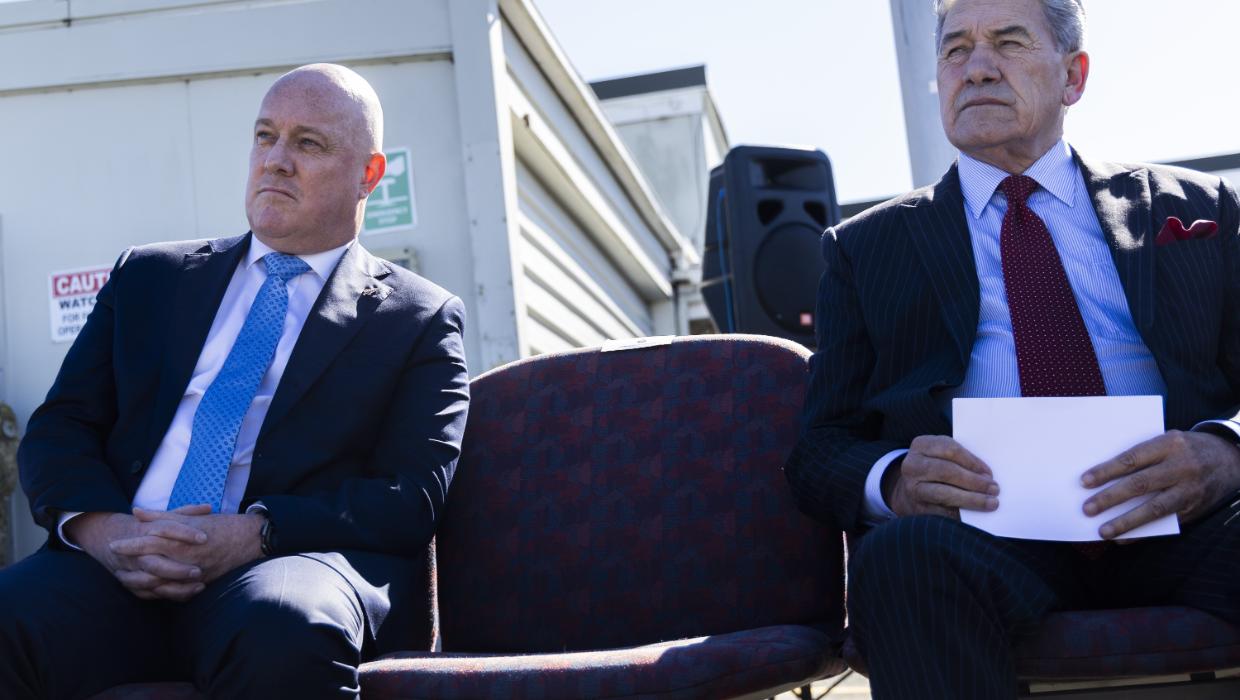Top Stories
Winston Peters Challenges Coalition on Asset Sales and Economy

New Zealand’s political landscape is heating up as Foreign Minister and NZ First leader Winston Peters criticizes the ruling coalition’s approach to asset sales and economic performance. During a recent parliamentary session, Peters labeled the National Party’s proposal for asset sales as “tawdry and silly.” His comments reflect a growing discontent within the coalition government regarding its economic strategies, a sentiment that could have significant implications for future elections.
The tension was evident in the House as Peters shifted the language of government procedural motions from “I move” to “we move,” emphasizing a collective responsibility among Cabinet ministers, including himself. This change in rhetoric is noteworthy, given the backdrop of a simmering dispute with Prime Minister Christopher Luxon over credit for the government’s overseas achievements. Luxon responded by reminding Peters that decisions are made collectively, suggesting that any economic shortcomings should be shared by all members of the coalition.
As both Peters and Luxon engage in this public discourse, it raises questions about the stability of the coalition and its future direction. Peters’ sharp criticisms provide the opposition parties with an opportunity to leverage his discontent, particularly as National is poised to revisit contentious issues such as superannuation changes, which are deeply unpopular with Peters and his supporters.
Peters’ stance against asset sales has been clear, and his declaration during a recent radio interview that there should be “no asset sales” signals a potential turning point in his political strategy. This position could complicate National’s efforts to build a coalition after the upcoming elections, especially if they continue to advocate for reforms that Peters vehemently opposes.
The political climate is increasingly precarious, with polling showing voter support for the governing coalition and opposition parties closely matched. As National considers its approach to asset sales, it must weigh the risk of alienating Peters and his party, which could tilt the balance of power in favor of Labour should the coalition fracture further.
Recent events have also revealed deeper issues within New Zealand’s political framework, particularly highlighted by a report from the Independent Police Conduct Authority exposing problematic police behavior. This report, coupled with the turmoil within Te Pāti Māori, which has seen two of its six MPs expelled, adds to the complexity of the current political environment, casting further doubt on the coalition’s ability to unify and govern effectively.
The challenges surrounding asset sales are not merely political; they touch on fundamental economic principles and the role of government in managing public assets. Christopher Luxon has called for a mature debate on the best use of the Crown’s asset base, yet the historical context suggests that discussions about asset sales are often fraught with political implications.
The questions remain: What principles should guide any potential asset sales? Should the government prioritize assets with strong commercial growth prospects or those providing essential public services? As the debate unfolds, it is evident that navigating these issues will require careful consideration and collaboration among coalition partners.
Looking ahead, the dynamics between Peters, Luxon, and the other coalition members will be critical. Peters has previously ruled out collaboration with Labour under current leader Chris Hipkins, but how he positions himself in the months leading up to the election will be telling. If National insists on policies that threaten his core beliefs, such as asset sales or changes to superannuation, Peters may find himself with little choice but to negotiate from a stronger position.
In conclusion, the political landscape in New Zealand is charged with potential conflict as the coalition grapples with internal dissent and external pressures. With the elections looming, how the parties manage these challenges will significantly shape the future of New Zealand’s governance and economic policy.
-

 Sports2 months ago
Sports2 months agoNetball New Zealand Stands Down Dame Noeline Taurua for Series
-

 Entertainment2 months ago
Entertainment2 months agoTributes Pour In for Lachlan Rofe, Reality Star, Dead at 47
-

 Entertainment1 month ago
Entertainment1 month agoNew ‘Maverick’ Chaser Joins Beat the Chasers Season Finale
-

 Sports2 weeks ago
Sports2 weeks agoEli Katoa Rushed to Hospital After Sideline Incident During Match
-

 Sports2 months ago
Sports2 months agoSilver Ferns Legend Laura Langman Criticizes Team’s Attitude
-

 Politics1 month ago
Politics1 month agoNetball NZ Calls for Respect Amid Dame Taurua’s Standoff
-

 Sports2 weeks ago
Sports2 weeks agoJamie Melham Triumphs Over Husband Ben in Melbourne Cup Victory
-

 Entertainment3 months ago
Entertainment3 months agoKhloe Kardashian Embraces Innovative Stem Cell Therapy in Mexico
-

 World4 months ago
World4 months agoPolice Arrest Multiple Individuals During Funeral for Zain Taikato-Fox
-

 Sports3 months ago
Sports3 months agoGaël Monfils Set to Defend ASB Classic Title in January 2026
-

 Entertainment2 months ago
Entertainment2 months agoTyson Fury’s Daughter Venezuela Gets Engaged at Birthday Bash
-

 Sports2 months ago
Sports2 months agoHeather McMahan Steps Down as Ryder Cup Host After Controversy


















